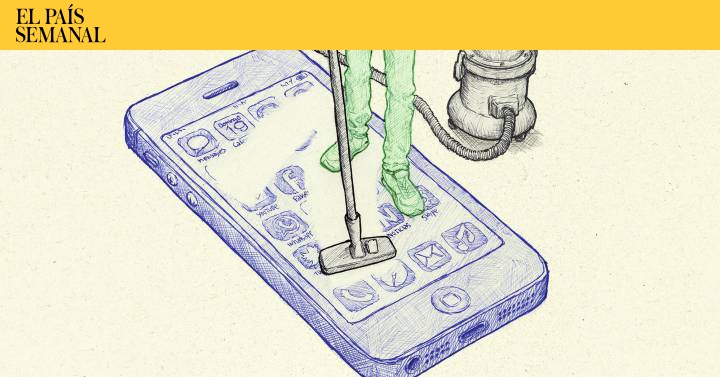As soon as she opens her eyes in the morning, Maria reaches for her mobile phone. Look at the messages that have come in during the night and, without getting out of bed yet, check out a couple of newspapers to catch up on the pandemic. She gets up uneasily and, while preparing breakfast, opens the real-time coronavirus map offered by Johns Hopkins University on her computer. There he checks the increase in cases and deaths in the world and in his own country, as well as in those where he has friends.
As he nibbles on a toast without hunger, he turns on the television. He learns of a complaint filed by the Catalan medical associations against a farmer who promotes false treatments against the virus from a toxic substance. Try to telework and WhatsApp do not stop entering videos of experts who give recommendations not to get infected, conspiracy theories, rants against the government's management of the crisis, supposedly funny memes ... All about Covid-19.
When Maria pauses mid-morning to exercise on the exercise bike, she turns on the radio. There he receives more information on a topic that increases his anxiety every day. Back at work, he gets half a dozen messages from people who want to know how he's doing. He also makes a couple of calls to friends and family who are scared. They talk about the current situation and how uncertain and worrying everything is. Lunchtime has not yet come and she is already exhausted and discouraged. A persistent headache makes her fear if she won't be infected, too. When will this nightmare end?
Neither she nor anyone else has a precise answer to that question, but there are four mental hygiene measures that we can take to make information a useful tool and not a flog for the nerves:
Limit the information. The important facts about the pandemic do not evolve as quickly so that we have to connect to the news at all times. Once we know the figures for the day, the rest are statements by politicians, commentators, debates, etc. An excess of information, more than nurturing our need to know, ends up becoming infoxication, a word coined by Alfons Cornella, founder of the company Infonomía. For health, it is advisable to cut the continuous streaming of news to decide when we want to receive our dose.
Choose rigorous means. The writer TS Eliot warned already in the last century that "knowledge does not imply wisdom, just as information does not imply knowledge". It is something to keep in mind amidst the bombardment of theories blaming the pandemic on secret biological warfare, the deployment of the 5G network or a nature defense mechanism to drive out human parasites. However, these hypotheses do nothing but add confusion to our mind, exhausted by monotheme and uncertainty. The WHO is already talking about an infodemic to refer to the excess of information on a subject, made up largely of hoaxes and rumors, which is not useful and ends up being counterproductive.
Mute WhatsApp groups and the like. With some participants having too much free time, these virtual communities are a bottomless pit of informational junk. In an effort to avoid hoaxes and overinformation, the same mobile messaging company today owned by Facebook is taking action against message forwarding, limiting it to once per chat or group. Even so, if we dose or turn off the tap on social networks, we will recover time, energy and serenity.
Compensating for negativity with evasion. Even if we take the above steps, we will continue to be exposed to the situation that keeps the entire planet on edge. Especially in the hours before going to bed, a very necessary measure of mental hygiene is to distract ourselves with content that has nothing to do with the pandemic we are experiencing. Whether it is an adventure novel or a comic film, we need kind stories that allow us to disconnect and regain the calm necessary for the times to come. —Eps
Francesc Miralles is a writer and journalist specialized in psychology.
Sleep better to face the day in a positive way
Doctor Eduard Estivill, founder of the Sleep Clinic, observes that the quality of rest has been affected by confinement, despite the fact that we spend more time in bed. Before the pandemic, the average sleep of adults in Spain was 6 hours 45 minutes. However, insomnia cases are currently increasing and many people confess to having more nightmares. This is due, according to this specialist, to the relaxation of schedules and habits, which disrupts our internal clock, and to the overload of alarming information throughout the day. In addition to establishing schedules, Estivill recommends limiting the information to one dose in the morning or at noon and disconnecting the rest of the day to improve the quality of sleep, and thus be able to face these strange days in a more positive way.

